Tuesday, August 02 2016
 THEN ... THEN ...
Fifteen years ago – give or take, my kids and their significant others decided to spend a long weekend at the summer place my parents built back when I was eleven. When our short hiatus was over, my son-in-law declared it the best weekend ever and suggested we do it for a whole week the following year. It has since become a tradition. The rest of my children have married now, all have kids of their own and our time together is every year more precious than the last.
The camp is tiny – originally intended as a temporary structure until my dad could build a real summer cottage on the high side of the island with a view down the lake. But then he got his first New Hampshire real estate tax bill and decided the 14’ x 14’ building was all we needed. With bunks on one wall and a small table in the opposite corner, he added a narrow porch along the front and called it done. A few years later, when my mom got tired of cooking all our meals over a campfire he added a small L-shaped kitchen on the back corner. When there were only five of us it was big enough, but today – not so much, so on the other half of the island a whole city of tents pop up every year to accommodate the ever growing family.
  
The fleet grows as well. Since this is an island we have to have a rowboat to get ourselves and all our gear out there. In fact, we have three rowboats, a big canoe, three kayaks and a Sunfish, and sometimes my oldest son brings his powerboat. The family grows even faster. It began with my five kids, one daughter-in-law and one son-in-law. Somewhere along the line my sister-in-law and her kids and their kids started coming and I now have fifteen grandkids. And my sister, her daughter, my brother and his son and grandson and my dad are among the crowd.
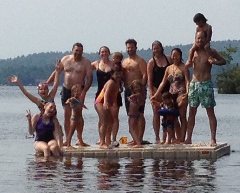  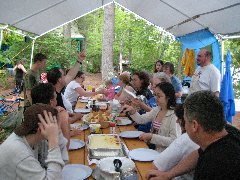
Every summer, I survey the bustle and joy going on around me and realize just how blessed I am. Unlike too many of my friends and acquaintances who live with dysfunctional families, siblings they don’t speak to, cousins they rarely see, kids who left the nest and never came back, I have it all. And everyone thoroughly enjoys being together for our annual week at the lake that we now call Mutt’s Nuts. We swim often, use all those boats in the fleet, play lots of cards, make puzzles, play a challenging game of croquet on an island with no grass and have a campfire every night. Every year we celebrate a holiday we don’t get to spend together. This year was New Years Eve, but other years we’ve had Christmas, Halloween, Easter, Valentine’s Day and more. We’ve celebrated birthdays, baby showers, wedding showers and retirements.
 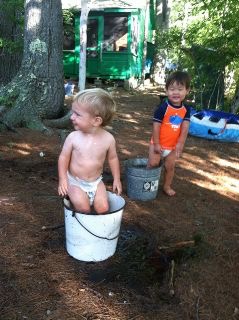 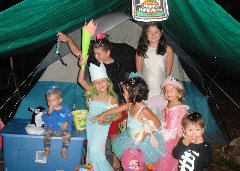
Cousins who all live in different states get to play together and make memories and friendships to last a lifetime. Adults kick back and spend time together while their offspring are busy making forts, hunting for fairy houses and exploring the island and the waters around it. Dinner is always great as each family puts on a feast on their night to cook. Sometimes we make ice cream. I make waffles at least one morning and my daughter treats us to crepes on another. And there are always s’mores around the campfire along with the most imaginative story-telling when the kids talk us into progressive stories and both kids and adults participate. Wild high-bush blueberries are everywhere so things like blueberry pie, cake, scones and pancakes are common, along with other home-made goodies that some of us enjoy making even on vacation.
 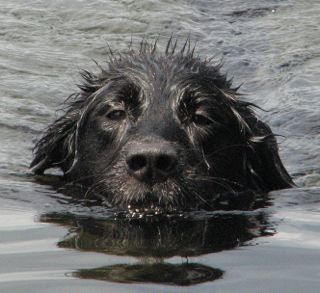 
Then comes the final day. In a whirlwind, the dining canopy comes down. The boats all get hauled and stowed for the winter. Tents get folded up, and luggage carted ashore and piled into cars. One family at a time, the goodbyes are said and the place gets quieter and quieter until everything is so still I can hear even the faintest breeze rustling in the trees. And it’s just Duffy and me. Along with another year of memories and photos, and love.
And NOW... 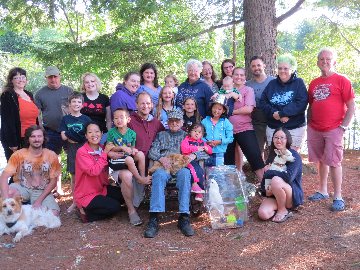 A few folk had to leave before we got the family photo taken, but this is most of the crew this year. And most years there are even more. A few folk had to leave before we got the family photo taken, but this is most of the crew this year. And most years there are even more.
Saturday, July 23 2016
When I was a kid, I read Heidi by Joanna Spyri and fell in love. I remember wishing with all my heart I could be Heidi and live on that mountain with Grandfather and Peter. And of all the great books I read as a kid, I still remember that story well. I read Mr. Poppins Penguins out loud to my dad while he was building a sailboat and I remember enjoying the story, but for the life of me, don’t remember any of it today. Neither do I recall much of the other stories I read during that part of my growing up. As a teenager, I read a trilogy by Elizabeth Ogilvie set before, during and after WWII on an island off the Maine coast: High Tide at Noon, Storm Tide and Ebbing Tide. And I loved those books and her hero Nils Sorenson as much as I’d loved Heidi. Long before Starz and Sam Heughan, I read Diana Gabaldon’s Outlander and fell in love again. Even though I read all of these books a long time ago, there isn’t much I don’t remember about them today.
 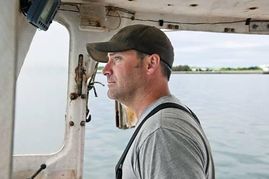 
So, what made these particular books memorable for me? I’ve read literally thousands of books, many of them great stories that I enjoyed tremendously while I was reading them and for at least some while after I closed the cover on the last page. I’ve read many books that were enjoyable to read, but that left little impression that lasted. From some of these books a character stands out here or there, like Jessie Best from Pamela Morsi’s Simple Jess. Or the young man who graduated from West Point just in time to get sent to Europe at the end of WWII in W.E.B.Griffin’s series Brotherhood of War. That soldier was not one of the main characters but he was unique and appeared throughout the series and he was my favorite character. A warrior who knew how to get the job done, but didn’t play the political game and had a flamboyant reputation. But those characters and stories don’t stay fresh in my memory like Heidi and Peter, Nils and Joanna Sorenson or Jamie Fraser. I love Lee Child's Jack Reacher and Vince Flynn's Mitch Rapp, but the plots all fade quickly. Same for so many others that fill my Kindle today.
 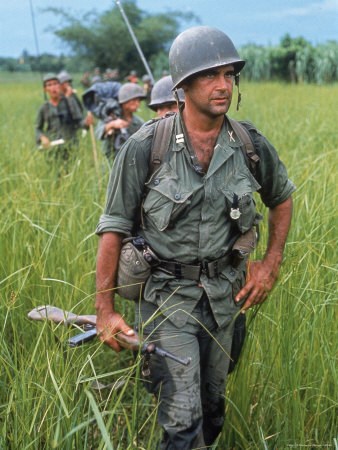 
Why? I think, it was a combination of compelling stories and characters I could relate to and fall in love with in settings that captured my imagination. I loved Jessie Best and he’s still one of my favorite characters, and the story compelling, but the setting, for me, wasn’t a place I ever wanted to be or see. That soldier in Griffin’s books was a complicated man I loved in the stories, but who knows, I might have disliked if I’d ever met him in person. I’d never been to Switzerland, but Spyri made that alp come alive. She created a girl I could relate to so much I wanted to be her and even in my childish heart, there was a bit of love for Peter. Ogilvie did the same with the Tide Trilogy. I had been to Maine, but her descriptions of this island off Maine’s coast, filled with a close-knit community was a place I wanted to go. Joanna was the main character, but my youthful heart fell in love with Nils Sorenson who loved Joanna the way I wanted to be loved when I grew up. Nils was the steady, reliable, caring man who was always there for Joanna no matter what she did, including breaking his heart at one point. Joanna was so much like me, perhaps that’s why I could relate to her so well. She was passionate and impulsive, and looking for adventure.
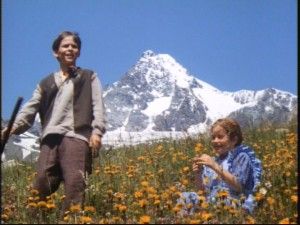  
Then came Outlander. There are millions of women who’ve met and loved Jamie Fraser, first through the books and now, with the face of Sam Heughan – what’s not to love? I have lost interest in the latest of the Outlander saga because I feel like these 1000 page tomes would have been far better if they’d been only 300 pages long with less distraction from Jamie and Clair. I find myself flipping forward, skipping vast portions of the books filled with minutiae of things that just don’t interest me. But that first book and even the second, caught my imagination just as Heidi and the Tide Trilogy did, with a setting I could almost feel myself a part of, with characters who were complicated and far from perfect that I could relate to and fall in love with and a story that swept me away from my everyday life and held me captive until the last heart-healing moment.
In summary, what makes a book memorable for me is one that has it all: Great writing, captivating stories, real people, settings that sing with adventure and romance to touch the heart. They are books I have and will read again … and again even though I already know how they will end. And every time I will be whisked away to a place I want to be, fall in love all over again, and sigh with satisfaction and a little sadness when I reach the end and have to say goodbye.

What makes a book memorable for you? Leave a comment and share your thoughts. Then hop on over to see what makes a book memorable for this line-up of authors.

Judith Copek http://lynx-sis.blogspot.com/
Beverley Bateman http://beverleybateman.blogspot.ca/
Dr. Bob Rich http://wp.me/p3Xihq-I4
Victoria Chatham http://victoriachatham.blogspot.ca
Helena Fairfax http://helenafairfax.com/
Marci Baun http://www.marcibaun.com/blog/
Rachael Kosinski http://rachaelkosinski.weebly.com/
Connie Vines http://connievines.blogspot.com/
Rhobin Courtright http://www.rhobinleecourtright.com
Tuesday, July 05 2016

I used to live in Maine year round . . . until I spent two years in the Peace Corps! I thought I’d always be a New England gal. I grew up in Massachusetts and spent my winters skiing, coasting, ice skating and having snowball wars. I learned to drive in the snow and slippery roads didn’t bother me. I had plenty of warm clothes and while I’ll admit that I didn’t much enjoy delivering newspapers before the sun was up on frigid winter days, I never really thought about being cold the rest of the time.
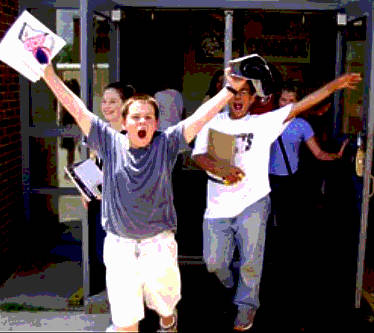 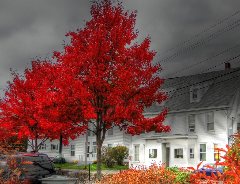
Summers, however, were never long enough. Like all kids, the last day of school was a mini-emancipation. The whole summer stretched out before me – endless days of sun-drenched freedom to do and go what ever I felt like each morning. But what felt like a never-ending season in June came to a screeching halt far too quickly the day after Labor Day. As an adult with kids of my own the seasons began to have less importance. It was all about keeping up with their school and after school schedules, but I still looked forward to summer. And while most of my peers seemed to enjoy the cool nights of fall and looked forward to the changing colors of the foliage, I still mourned the end of summer.
Then, in my mid fifties, I made a bold choice. I applied to join the Peace Corps and got accepted. I leased my house, put my job on hold and ventured half the world away to experience life in a whole new way. I acquired a new Tongan family that welcomed me into their home, learned patience while coping with a very different work ethic, and adapted to the community lifestyle where things were often “borrowed” without asking because you weren’t using it, and someone else needed it. Peace Corps endowed me with a tiny dorm sized refrigerator but the family I lived with and most of their neighbors did not have refrigerators so I’d often find things that weren’t mine taking up shelf space. I lost three pair of flip flops that were “borrowed” -- one pair while I was at a wedding reception. The Tongan ladies clucked about me being barefoot but no one seemed to think it odd that someone would take my shoes while I was in the house admiring the wedding gifts.
 
But the biggest adjustment was the climate. I left Maine in February. I’d been coasting with my grandson just days before I flew out of Portland on my way to the South Pacific where it was still summer. I stepped out of the Air New Zealand jet onto stairs like the president uses when deplaning from Air Force One and the heat coming up off the tarmac even at dusk hit me like a blast from an oven. The thought going through my head at the time was, “What have I gotten myself into? Two years of this?” My first night I lay spread eagle on my bed trying to find comfort in the lazily turning ceiling fan that barely stirred the air. But before I knew it, I’d gotten used to that heat. I no longer noticed my clothes were always a little damp unless I happened to go into the bank, which was the only air-conditioned building on my island. And then I couldn’t wait to get back outside and get warm again. I’d been told in training that the local women used their umbrellas to keep the sun off, not the rain. We laughed, but it was true. It was 10-15 degrees cooler under the umbrella and getting soaked in a brief downpour felt good.
 
But mostly I enjoyed the endless days of sun and warmth. Even in the winter the temps at night never went below the mid 70s. I reveled in the sunshine warm on my head and shoulders as I walked to work and home again. And I especially loved the balmy evenings when the mother of the family I lived with and I would lay on woven mats on the veranda and talk in the soft darkness. Summer finally – FINALLY – lasted long enough.
Or almost. Two and a half years later I returned home, thankfully in May so my body had at least the brief Maine summer to get used to the change before winter set in. That first winter home felt endless. Snow started in November and didn’t quit until May. For several months it was dark when I got up in the morning and dark when I drove home from work. I missed the warmth and sun of Tonga more than I would ever have imagined. My second year, by March I was so depressed by the cold and dark, I flew to Florida for a week’s vacation, partly in Fort Pierce visiting a friend and partly in St Augustine. On my last morning there it was still dark as I waited for my taxi ride to the airport, but it was a soft, balmy, welcoming dark. Nothing like the hard edged dark of Maine in March. Like quarterbacking the Saturday game on Monday, I suddenly realized I had always loved summer best. Not so much for the endless carefree days of youth, but everything. The warmth, the sunshine, water warm enough to swim in, rain that felt like a blessing, breezes that brought the scent of flowers. Everything around me lush and green. Even the sudden deluges and the flash and rumble of a thunderstorm.
  
And that’s how I came to live in St Augustine, drawn by the climate and the history and the miles of beautiful beaches. I still miss the crunch of a ripe apple in the fall and the heady scent of lilacs in the spring, but enough to endure another winter. And I miss the very different ambiance of the Maine coast, the muttering growl of lobster boats as their captains haul their pots, the cries of gulls along the shore, lupine filling the fields in the late spring, and of course, a real Down East lobster – a lobster that was caught just a few hours before it hit the pot. So now I come here for a few weeks each summer. Unlike the snowbirds who live here and fly south in the winter, I live in the south and fly here for a taste of Maine each summer. Perhaps that makes me a sunbird. I don’t scramble over the rocks like I did when I was younger, but I appreciate the blessing of just being here with the tang of salt in the air and the abundant beauty that is Maine. In the Summer!
 
Saturday, June 25 2016
June Round Robin Blog Hop: How emotionally involved are you in reading or writing some scenes?
As a reader, the answer to this question varies, but the books I found myself the most deeply involved in emotionally are the ones I remember years and years later. To be honest, I’ve read thousands of books in my lifetime and remember very few of them. They were fun while I was reading them and most of them left me satisfied, but they don’t stay with me. Ironically, while I don’t recall all of the story, one book that I will never forget was recommended to me by a friend. Set in England I think in the 1600s, the book, Forever Amber left me so disappointed I wanted to throw it at something - probably my friend if she'd been at hand. I so wanted things to work out for the heroine and there was a good man who loved her, but she kept making other choices, bad choices, unfixable choices until he finally left her. Through the whole book, scene after promising scene, I kept rooting for her to see the goodness in this one man who really loved her rather than chasing after something else that was never going to last. Right up to the end, she never learned, and never redeemed herself. I was totally emotionally involved in that even though the HEA never happened for her and I wished I’d never read the book in the first place. But I think that kind of emotional involvement and the author’s ability to make us feel that strongly is what makes a great book.
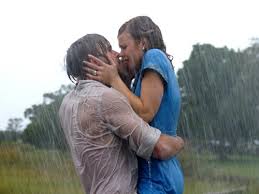 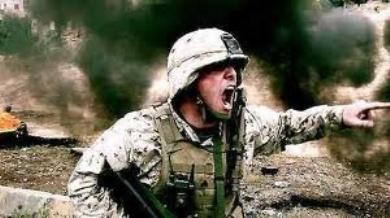
As a listening reader – now that so many great stories are available on audible, I enjoy them while I listen, but soon forget – perhaps it’s not having seen the written word – I don’t know. But one thing I have to say for audible is that you are there – I mean really THERE. If the hero or heroine is being stalked your hair is standing on end. If two lovers are getting it on, if it’s really well done, you can’t help feeling aroused. When something really sad happens you can’t stop the tears either. Recently, I was driving to a meeting in Jacksonville, a little over an hour from my home so I always leave plenty of time in case of traffic or other unforeseen holdups. On this trip I was listening to a suspense story about a covert, super dangerous mission. When I pulled into the library parking lot, I felt like I was in a rush. Like I was running late. I gathered up my stuff and hurried inside only to discover I was early, no need for the rush. I sat down and suddenly felt drained. I had been so emotionally invested in that story I was physically reacting as if it was me that was fighting for my life and desperate to get to safety before it was too late. Good writing and excellent reading on the part of the actor. It took me as long to recover from that adrenalin rush and the following let down as it would have had I experienced the action myself. The entire book was not that edge of the seat, but those scenes surely were.
 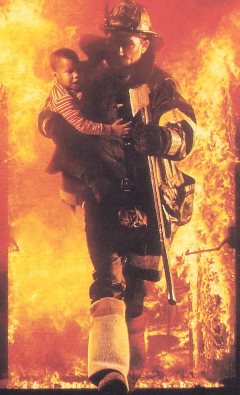 
As a writer, I am mostly always emotionally involved. I don’t write well if I’m not. As Steve Jobs said: "If you are working on something exciting that you really care about, you don't have to be pushed. The vision pulls you." This applies to writing, too. If I am emotionally invested and excited about what’s happening to my characters I don’t have to struggle to find the words – the words will race along at a furious place, and I’ll be breathlessly trying to keep up. Often I'll get caught up in activity or family stuff that takes me away from writing for a few days or even a week or more. When I come back, I open my manuscript, stare at the last thing I wrote and even with an outline or comments on post-its about where I’m supposed to go next, I find myself dragging the words out, desperate to get the action going, frustrated by my non-involvement. I always have to go back at least a chapter or more and just read what was happening before the interruption to get myself emotionally back into the story, back to feeling what my characters are feeling and being urged on by their needs and wants. So, for me as a writer, YES, I most definitely have to be emotionally involved in every scene – otherwise the book would never happen. There’s a downside to this kind of involvement though. When you get to the end you feel this incredible letdown. It’s like my BFF just moved to the other side of the planet and I miss my characters dreadfully. They’ve been in my head and heart for weeks, or months, and now they are gone. I wander around the house wondering what to do with myself. There’s always housework, and probably a maintenance project or two I’ve been putting off while chasing after the story, but they don’t have the emotional pull my story did, and I feel a little empty for awhile. And then I start a new book and get excited all over again.
 
Check out how these authors feel about emotional involvement:
Anne Stenhouse http://annestenhousenovelist.wordpress.com/
Marci Baun http://www.marcibaun.com/blog/
Heather Haven http://heatherhavenstories.com/blog/
Victoria Chatham http://victoriachatham.blogspot.ca
Dr. Bob Rich https://bobrich18.wordpress.com/2016/06/25/emotion-in-writing
Diane Bator http://dbator.blogspot.ca/
Beverley Bateman http://beverleybateman.blogspot.ca/
Rachael Kosinski http://rachaelkosinski.weebly.com/
Margaret Fieland http://margaretfieland.wordpress.com
Connie Vines http://connievines.blogspot.com/
Rhobin Courtright http://www.rhobinleecourtright.com
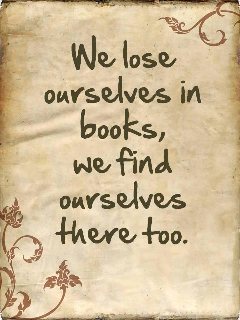
Tuesday, June 14 2016

The other day a friend of mine posted this meme on Facebook. Quite a few people echoed the sentiment, but one woman said she didn’t miss it at all. She made good points. In her words: “Girls were given too few career options. Women were expected to stay with abusive husbands rather than seek help. Lunch counters in the South served only white patrons. Segregated schools provided an education unequal to what white students received. We have made great progress, let's not go backwards.”
But I still miss the America I grew up in. I miss that children could be allowed to go out to play from breakfast until the streetlights came on at night without being hovered over by a parent. That we were allowed to fall down and learn from our mistakes, pick ourselves up and try again, instead of having a parent “fixing” it for us. When children grow up learning from their mistakes and taking responsibility for their choices, they grow into adults who take responsibility.
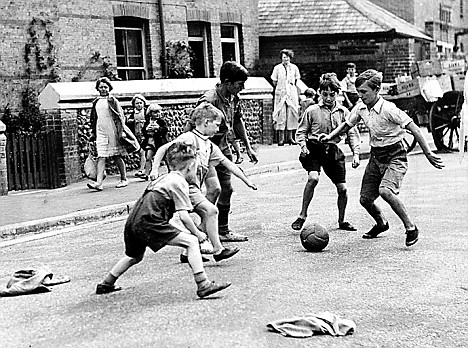 
I miss the America I grew up in because there was a very clear moral compass to our lives. Not everyone was Christian, but the same moral code seemed to be pretty much ingrained in our society. We had a reverence for life, our own and everyone else’s. I’m not claiming that there was no lawlessness, because certainly there was. Before my time the government decided that alcohol was an evil that could be legislated away and prohibition became the law of the land. Obviously this “law” didn’t work, rum running became a profession and crime families thrived. But somehow, we’ve forgotten this lesson and have come to believe that all we have to do is pass a law and the problem will go away.
But the lack of “civility” in our civil society, and the continuous efforts to remove any hint of morality (because it might feel too much like religion) have taken their toll on the America I grew up in. When I was a child, men and older boys had rifles carried in gun racks against the back window of their trucks. And the trucks were not locked. But how often did those totally unrestricted guns get used as they have been in recent years? As I came of age, sit-ins were popular forms of dissent, first for equal treatment for African Americans and desegregation, and later in protest of the Vietnam War. Those were true protests and eventually the voices of those who protested were heard. But today, far too often, what is hailed as a protest is a riot, with intent to hurt, maim, kill, burn and loot. And our leaders have come to call these riots protests and the behavior as acceptable. Not only that, we turned on the very people who put their lives on the line every day to maintain law and order. So far this year alone, 25 law enforcement officers have been deliberately killed on duty, targeted and ambushed just because they were officers of the law, not for anything they have done wrong. I am not defending police brutality, but rather the idea that if you are pissed off with the status quo as you see it, a legitimate way to address your anger is to kill other cops, firefighters and EMTs who are responding to calls.
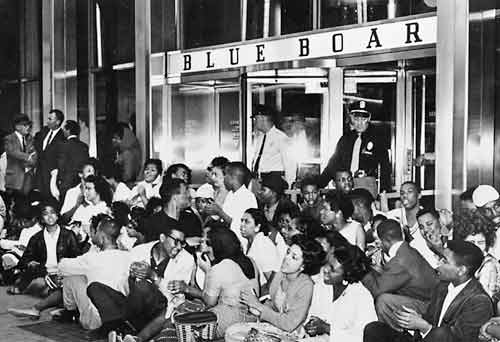 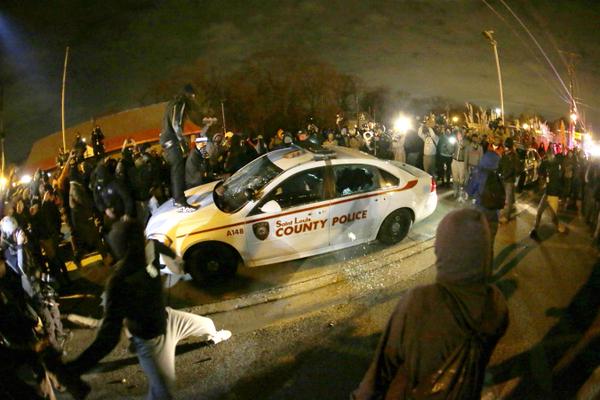
So, yes – I miss the America I grew up in. I miss that we could find a way to settle arguments and differences of opinion without anything more violent than a bloody nose. I miss that we have lost our respect for life – every life – and for each other regardless of our differences. We fill our children’s growing, learning brains with murder and mayhem in the form of violence on TV and video games that score the kills. We fail to teach our sons how women should be treated and expect the courts to be lenient when they make a “mistake” and rape an unconscious woman. Our schools, all the way up and through college must be “safe” places where no student must ever hear or see something that they find uncomfortable, and when they get out into the world they haven’t learned how to accept others who are different than they are with tolerance.
 
I am proud to be an American. I am proud to represent what America has historically stood for and I am proud to be part of some of the best things that America still is. But I am ashamed of what American society has become. And I fear that the pendulum will not begin to swing the other way until we accept the fact that a moral underpinning is absolutely required for a civil society to exist. The United States is the most philanthropic country in the world and yet – we still have not learned tolerance and acceptance and respect for life – all lives matter.

Tuesday, June 07 2016
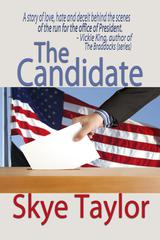
Have you ever come across something unexpectedly? Something you haven't seen in years? Something that jerked you back without warning to a time you'd done your best to forget? And been overwhelmed with emotions you never wanted to remember?
That's what happens to Matt Steele, in the middle of a hotly contested race for the White House and it's going to change everything he thought he knew about himself.
Available at: Amazon, Barnes & Noble, and Kobo
Here's an excerpt:
He gaped at the tattered photograph that had just been slipped into his hand. His heart raced, and Senator Matt Steele, Democratic candidate for president, halted so abruptly his Secret Service agent bumped into him.
“Keep moving, sir.” Joe Venuto urged. Matt barely heard the warning.
“Senator Steele!” A lilting, accented voice shouted above the noise of the crowd. “I must speak with you.”
Matt curled his fingers around the photograph as if to protect it. He raised his gaze to search for the voice. A man’s face with high Asian cheekbones and uncharacteristically blue eyes appeared over Joe’s shoulder. The man fought the jostling crowds to stay close to the rope that separated Matt and his entourage from the press of people who had come to the rally.
“Please, sir! It’s important.”
Matt took another look at the dog-eared snapshot, and then turned to Joe. “Bring him to the bus.”
“Sir, that’s not a good idea. We don’t even know who he is.”
“Pat him down. Run a check on him with that phone of yours, or whatever you want, but I need to see him. In my bus. Now.” Matt turned and strode toward the campaign bus, heedless of the crowd still hoping for their brief moment of his time. Joe hustled to keep up. Matt heard him speak to another man in the detail. He tuned Joe out. Tuned out his chief of staff and his press secretary who were probably confused by Matt’s sudden departure from the planned handshaking opportunity. He tuned out everything, except the photograph in his hand.
As Matt approached, the driver of his campaign bus opened the door, and Matt took all three steps in one leap. “Wait outside, please.”
The driver looked at him in surprise, but then rose to his feet and climbed down out of the bus.
Matt sank onto the soft faux-leather recliner of his mobile headquarters and opened his hand. The photograph remained curled so he set it on the coffee table and pressed it flat.
A group of laughing Marines dressed in fatigues stared up at him. His much younger self among them. Matt raked thoughtless fingers through his carefully groomed hair, dislodging the difficult lock of bangs that immediately fell onto his brow. He pushed them aside and studied the photo.
His cousin Sam Davis stood in the center of the group grinning broadly. He had one arm draped across Matt’s shoulders, and the other around a slender young Vietnamese woman. Sam had been his best friend and the closest thing he’d ever had to a brother. Matt remembered the day the photograph was taken. More than thirty years ago. A week before Sam had been killed.
The door swished open, and Joe stepped up into the stairwell. “Sir, this man is not a voter. He’s not even an- - ”
“Let him in.”
The Secret Service agent frowned but stepped aside to let the visitor pass by him in the narrow stairway.
“You can leave, Joe.”
“But, sir!”
“Out. Please.”
Joe’s expression said he wasn’t happy about any of it, but with a brief salute, he turned and left. When Joe was gone, Matt invited his guest to come up the stairs and join him.
“I will only take a moment of your time, sir.”
The stranger stopped on the other side of the coffee table, and Matt found himself looking up into an eerily familiar pair of sky-blue eyes. He felt as if he’d met the man before, but he couldn’t think where or when. An emotion he couldn’t identify squeezed into his chest. He rose slowly. Fought to ignore the intense feeling of disorienting familiarity, and extended his hand.
“How may I help you?”
His guest smiled and accepted Matt’s hand. “It is good of you to see me, sir.” His precise English held a trace of the singsong accent of Southeast Asia. He was several inches shorter than Matt’s six feet four inches, had straight black hair, and those blue eyes that were so unexpected in an Asian face.
Matt gestured for the man to sit and resumed his own seat.
“I am Thanh Davis”
The surname added to Matt’s confusion and jangled emotions. “Davis?”
“Yes, but please, you may call me Thanh.” He perched gingerly on the edge of the couch that matched Matt’s chair. “We met. Sort of…” Thanh continued.
I have met this guy. No wonder he seems familiar. Matt pointed to the photograph lying, still slightly curled at the edges, on the table between them. “W-Where,” Matt cleared his throat, “did you get this?”
Tuesday, May 31 2016
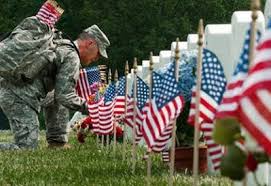 
Old Guard sets out flags Funeral for Charles Keating, Coronado, CA
Memorial Day was different for me this year. As a USO volunteer, I was invited to attend a memorial mass for decorated Navy SEAL Charles Keating, IV. There are lots of activities I could have chosen to spend this day doing. Things I’ve done in years past: either march in or attend a parade, join friends for a barbeque, visit a cemetery or attend Memorial Day Observances at the local national cemetery, or even stay home and mow the lawn, nap in my hammock or walk down to the beach. But supporting the family of this sailor who had given his life for the ideals I believe in seemed more fitting.
It was a humbling experience. Listening to his fellow SEALs, his parents, his friends, hearing snippets of letters he’d written to his siblings that began with “If you are reading this, I didn’t make it home…” All of it brought the enormity of this loss into clear and heartbreaking focus. Charlie was one of the thousands of men and women who write that blank check to the US for service up to and including their lives. His parents and his siblings are just one of the far too many gold star families who have had to bury a son, or a daughter, or a husband or a wife, or a father or mother. Their loss was personal and for that moment in time, it became personal for me as well. This is what Memorial Day is all about. Honoring all those who have fallen in service to our country, standing up for the ideals we all profess to believe in, laying down their lives to save those of their fellow warriors.
Later, as I watched the news on TV, a man was interviewing random people on the street asking what they thought Memorial Day was all about. I was appalled at the ignorance. So many people with no idea, no sense of anything beyond themselves. Has this nation of takers become so selfish and self-centered that we can’t even spend a moment in prayer or silence to remember those who sacrificed so much for our freedom to live life the way we wish? Or even be aware that the day they get off from work has a meaning beyond their small world? I doubt there was a single American soul who did not know or celebrate this day after the end of WWII. There was certainly plenty of awareness that we were at war, whether you agreed with it or not during the Vietnam era. What has changed? Did the ending of the draft mean that we no longer need to be concerned with the defense of freedom or the price that others pay to secure it? Or is this just another facet of the sickness that has led to random acts of killing, riots and looting masked as protests, lack of respect for life, and the breakdown of our moral society? If so, I weep for this country’s future.
At sundown last night, I took down my flag – humbled by my choice of how to spend my day and utterly saddened that for so many, the day meant nothing at all. In all the wars Americans have fought in the name of freedom, more than 1 million, 264 thousand men and women have sacrificed their lives. That should stand for something for every single American.
RIP, Charlie Keating – and all the brothers and sisters who went before you. God Bless.
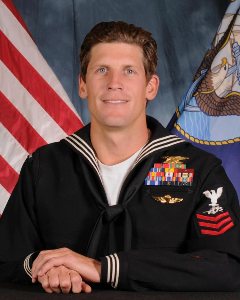
Saturday, May 21 2016
Welcome to the Blog Hop - it’s the merry month of May and we are talking about confrontation and how it creates powerful drama. Without conflict there is no story and conflict brings confrontation before resolution. Whether it's a protagonist who finds him or herself thwarted by circumstances or opponents, or lovers on opposite sides of a problem, their desires and motives push them into the action that makes the story exciting. I'm fortunate that I have a brainstorming group we call the Sandy Scribblers because I tend to be a Pollyanna and I don't want to hurt my characters. But my Sandy buddies ask the tough questions that make me stop and rethink my plot or my characters' motivations. Often they help me come up with great ways to create conflict and confrontaion. My new book HEALING A HERO which is coming out this summer is a reunion story and the final black moment is full of confrontation. Here's an excerpt.

Background: One crazy summer, in a whirlwind affair Philip and Elena fell in love while Philip was home on leave, and while no commitments were made when they had to say goodbye, both were eager for his tour aboard a Navy ship in the South China Sea to end so they could be back together again. But then 9/11 happened and due to circumstances neither could control, they lost touch. Philip, a Marine, was sent almost immediately and without warning to Afghanistan and Elena was left wondering why he stopped e-mailing her.
 
Now, fourteen years later, Philip is injured and in rehab and it turns out Elena is his therapist. Although it breaks all the rules the attraction and passion they once shared comes roaring back and both are eager to start fresh. Then Philip learns that Elena’s daughter Julie is his child.
“I was going to tell you—”
“You should have told me fourteen years ago,” Philip cut her off, his tone harsher than he intended.
“Fourteen years ago I didn’t think you cared.” Elena set her untouched sandwich back into the wrapping it had come out of.
Her accusation slammed into Philip with the force of a sucker punch. “After everything that happened to us that summer?” he asked incredulously. “How could you ever have believed I wouldn’t care?”
“You never replied to my emails. What was I supposed to think?”
“You could have called Jake. He’d have told you why I couldn’t write.”
“I didn’t know Jake knew about us.”
“He knew I loved you,” Philip shot back. He shoved the sandwich he no longer felt like eating into the bag and pushed it aside. “You could have swallowed that damned pride of yours and called my parents.”
Elena blanched. “I couldn’t call them, Philip. I’d have been too embarrassed.”
“Embarrassed?” Philip shouted. Several heads turned their way. Coming to the canteen for this conversation had been a bad idea. His uniform betrayed his rank, and his behavior was inappropriate. He lowered his voice. “You going to eat that?”
She shook her head.
“Good. Let’s get out of here.”
He grabbed her hand and pulled her from her chair, led her through the now goggling crowd and out the door. He dragged her along in his wake until they were clear of the buildings where he turned onto a short cut to somewhere on the next block and finally stopped in a cluster of young trees that afforded them at least the illusion of privacy.
“My parents would never have blamed you. I’d have gotten a reaming, but if you’d gone to them they’d have helped you out in any way they could.”
“I barely knew them.” Elena crossed her arms over her chest.
“But they’re my parents. Julie’s grandparents. And they’d have been better able to reach me and get me back home to accept my share of the responsibility for getting you pregnant. I might have been in disgrace, but I’d have come no matter what was happening in Afghanistan. I’d have found a way.” Anguish was tearing him up inside.
Elena lost some of the defensive posture, but her body language told him she still blamed him for everything she’d endured.
“Do you have any idea how I felt when I got back and discovered you were married? After you promised to wait for me?” His chest ached
“I can explain.”
A bloom of anger erupted, shoving the pain aside. “You’ve had fourteen years to explain. You were pregnant with my baby. I had a right to know.”
“I’m sorry,”
“Sorry!” Philip shouted. He felt the veins popping out in his neck and temples. He shouldn’t be dumping on her like this, but he couldn’t seem to stop the steamroller that had gotten hold of his self-control and was flattening everything in its path. “I’ve missed my daughter’s whole growing up. And you’re sorry? You can’t ever give those years back, Elena. They’re just gone.”
Elena stopped arguing. Stopped apologizing and just stood there cringing like a whipped puppy. Philip ignored the stab of doubt and plowed on.
“What about last week? When we were baring our souls and promising each other a new beginning? What about then? Why didn’t you tell me then?”
Philip’s cell phone rang. He ignored it.
“Didn’t you think it would be important to tell me about Julie when we were talking about the rest of our lives? You’re as big a liar as Holly.”
Elena looked like he’d hit her.
“What about Julie? Didn’t she have the right to know her own father? If you’d told me you were pregnant, I would never have forced you to marry me if you didn’t want to, but I had a right to know. Julie is my daughter. I had a right to know about her. And she had a right to know who her real father was.”
Unable to stand still, he turned in an angry little circle and came back to loom over her.
“When I got home that next summer, I was all set to hunt you down and find out why you stopped writing. I meant for us to get reconnected. Then Andy told me you were married.
“Married!” Philip rammed his fingers through his already disheveled hair. “You can’t begin to understand how I felt. Every dream I had of coming home and making a life with you was smashed all to hell and back. I couldn’t volunteer fast enough to get back into action so I could forget. But if I’d known about Julie, I never would have gone.” His phone rang again, and again he ignored it. “I wouldn’t have been shipped out of the country on every deployment I could get signed up for since then either.”
“But you were gone. And Julie had Eli. Eli was her father as far as she knew.” The whipped puppy was gone. Elena squared her shoulders and punched two fingers into Philip’s chest. “She had a father who was there for her.”
“And that was a lie too, wasn’t it. I’m beginning to feel sorry for the bastard. You lied to me. You lied to Julie. And you lied to Eli.”
“I never lied to Eli. He knew from the beginning how I felt.”
“You married him. You promised to love and cherish him. Or have you forgotten that part of the vows?”
“We were married by a justice of the peace.”
“So you never mentioned love? Or fidelity. What did you promise him that you didn’t really mean?”
“I promised to be his wife. And I did mean it.”
“You put that man through hell because you couldn’t muster up the kind of love a wife should feel for her husband. Gratitude doesn’t cut it, Elena. No wonder he went looking elsewhere.”
Philip’s phone rang a third time.
“Dammit!” He yanked the offending gadget from his pocket and glared at it. Crap! He should never have started this conversation when there was never going to be enough time to finish it. “We’re not done. But I have to answer this.”
“We’re definitely not done,” Elena snapped. “But don’t bother to call me again until you cool off. You aren’t the only injured party here.” With that, she spun on her heel and stormed off through the trees to the lawn beyond.
Philip gasped at the pain slicing through him. In just two short days he’d gone from ridiculously happy thinking he’d won back the one woman he could love for a lifetime, to finding out he had a thirteen-year-old daughter he barely knew, to this.
To this shattered empty place where his heart used to be.

 
Check out how all these authors have used confrontation to add drama to their stories:
Dr. Bob Rich
Connie Vines
Helena Fairfax
Fiona McGier
Rachael Kosinski
Victoria Chatham
Beverley Bateman
Judith Copek
Rhobin Courtright
Margaret Fieland
Diane Bator
Wednesday, May 11 2016
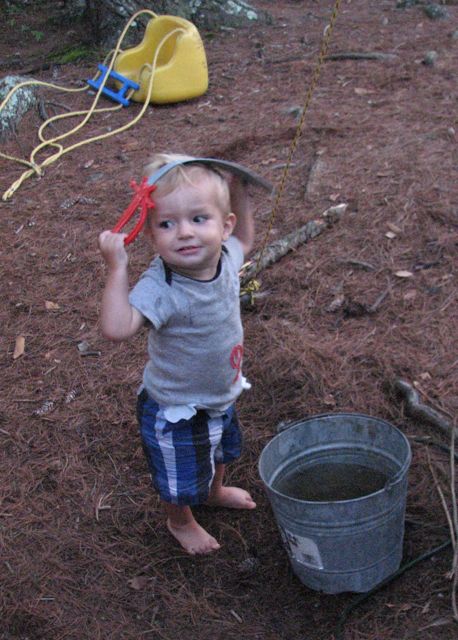 
My bucket list has gotten so long I doubt I can possibly live long enough to achieve everything on it. But maybe that’s a good thing. I’ll never lack for something to look forward to. Or something to work for. And my life will always have the possibility of new experiences and great rewards.
Becoming a published author was a bucket list item and now that I have several books out, that desire has not diminished. I have so many stories I want to tell – that ought to keep me busy even when I can’t travel. The fun thing about books whether I’m writing them, or reading is that I can go anywhere in the world. I can even do the impossible and travel through time. I could envision a future that hasn’t come yet. Or I can visit a past that’s faded into history. I can meet famous people and I can create new ones. Writing more books is definitely still on my bucket list. My newest book, HEALING A HERO will be out this summer.
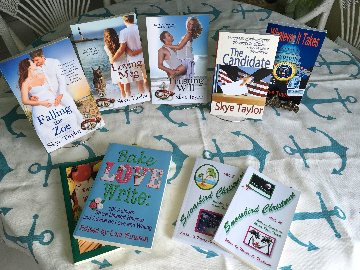
I love to travel, although lately most of my travel has been to visit my kids rather than explore new places. Being on Facebook keeps me in touch with far more people than I could ever hope to see on a regular basis, but it also provides me with stunning photos of yet more places I’d love to visit in person. So far, I’ve been to fifteen countries and spent time in twenty-nine states. Just in the US alone that leaves twenty-one states I haven’t been to and several of the places on my bucket list are in those states.
Living on the beach was another bucket list dream that came to be, but even though I live here and enjoy it every day of my life, beaches are still a very strong draw for me. Everywhere I’ve traveled on the world, if there’s a beach, I’ve walked on it. From the windswept beaches of Nova Scotia, Scotland and Wales to the quiet coves in Provence, France, La Jolla, CA, and Tonga. I’ve gone swimming in the South China Sea in Vietnam, and from remote islands in the South Pacific, and even in the frigid waters of Maine and Coronado Beach California. Lucky for me, there are a lot more beaches yet to explore. The most recent one was Montauk New York - too chilly to swim, but beautiful anyway. As were the beaches of the South Island of New Zealand.
  
I’ve taken a helicopter ride onto a glacier in New Zealand, but not down into the Grand Canyon. I’ve been to Niagara Falls, but have yet to see Angel Falls in Venezuela. I lived for two years in the South Pacific, but I’ve never been to the Caribbean. I’ve marveled at the opulence Versailles, the Price Regent’s Pavilion in England and The Breakers in Newport, but haven’t seen the grandeur of the Biltmore Estate in Asheville, NC. I’ve been in Times Square and Paris on New Year’s Eve, but Hogmanay in Edinburg Scotland is still on my Bucket List. So many incredible experiences in my past, but still so many more to look forward to.
     
So - what's on your bucket list?
Tuesday, May 03 2016
For twenty years, I lived on the beautiful coast of Maine. From my front yard, I could see the scattering of islands just outside of Boothbay Harbor. One of them has a light and the light keeper’s home on it. Some are just knobs of grass surrounded by stony beaches and ledges. But one of them, Damariscove, caught my interest in particular.
 
I’d read the history of the islands of the Maine and how there were communities of Europeans living on those islands fishing the teeming waters and salting their catch to be shipped back to hungry Europeans. The islands were a natural place for the Europeans to set up their fishing camps – protected to some degree from the native Americans by water, and easily accessible for the big ships from Europe. In the journal of Henry Winslow, a pilgrim who had come north to beg for food when the little settlement at Plymouth was starving and in need, he mentioned that there were thirty ships of sail in that harbor and that the good people of Damariscove had given them four hundred pounds of food. Later I read an account of how Capt. Henry Mowat of the British Royal Navy had been given orders to harass the communities along the New England coast to discourage them from joining the patriot cause just before the Revolutionary War broke out. While carrying out those orders, he put in at Damariscove and commandeered seventy sheep to feed his crew of sailors and Marines, then the following day set sail for Falmouth, now known as Portland Maine, and burned the little port city to the ground. During the War of 1812 the men of Damariscove were able to watch the sea battle between the British ship Boxer and the American Enterprise from their own shore. And there are even stories of a pirate coming ashore to hide his treasure in the pond.
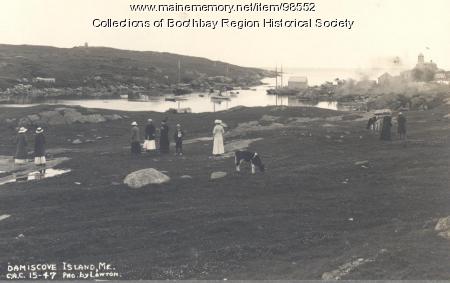  
Until the mid 1950s there was, like on many Maine coastal islands, a vibrant community of fishermen and farmers living on Damarsicove Island. There was a school, a lobster buyer, stores, a post office, a community hall and church services. For a number of reasons, including government interference in the lobster industry, as well as the changing dynamics of rural life and suburban development, families who had lived on those islands and fished their waters for generations began moving ashore and finding new careers. Eventually the schools and shops closed and one by one, the islands became deserted. Damariscove was one of those islands.
From my front yard I contemplated what I could see of this now treeless little island, and I was taken by the desire to explore it. We sailed out there on a beautiful sunny summer day, anchored in one of the coves and rowed our dinghy ashore. There are a few buildings still standing. The coast guard life saving station is kept maintained, although no one mans it any more. Folk interested in the history of the island have created a little museum of sorts in what’s left of a tiny house with bits and pieces of the past displayed for any who happens to wander ashore.
As I stood at the high point of the island and gazed back toward the harbor that Captain John Smith had once described as a busy place, I considered the ghosts who are supposed to haunt this place. A headless man named Pattishall and his faithful dog, a woman with long flowing hair who has been seen walking into the pond. There are others, I’m sure. But as I stood there, balanced on the edge of an old foundation with nothing but a carpet of grass and daisies spread out below my feet, the thought came to me: What if I slipped and fell into this old cellar hole? And what if I hit my head and was knocked unconscious? What if when I woke up, there was a roof over my head? What then?
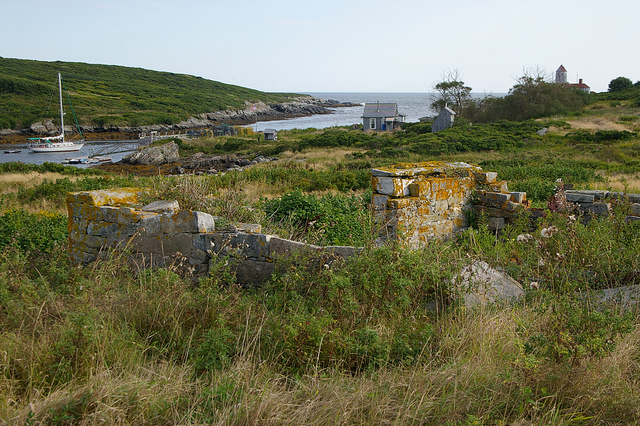
That was how my book, Iain’s Plaid came to be. It’s not been published yet, but it will be one of these days. From a fascinating, yet little known island on the Maine coast with a long and storied history came a really fun tale of a woman who sailed out there just like I had, who did fall into that cellar hole and woke up in 1775.
Sign up for my newsletter and when this story comes to life in a book you can hold in your hand or download to your e-reader, I'll be sending out an announcement. http://eepurl.com/bsaNs In the meantime, I interview a different author every month. You might get a peek into the life and writing of one of your favorite authors, or you might find a new author to check out.
|